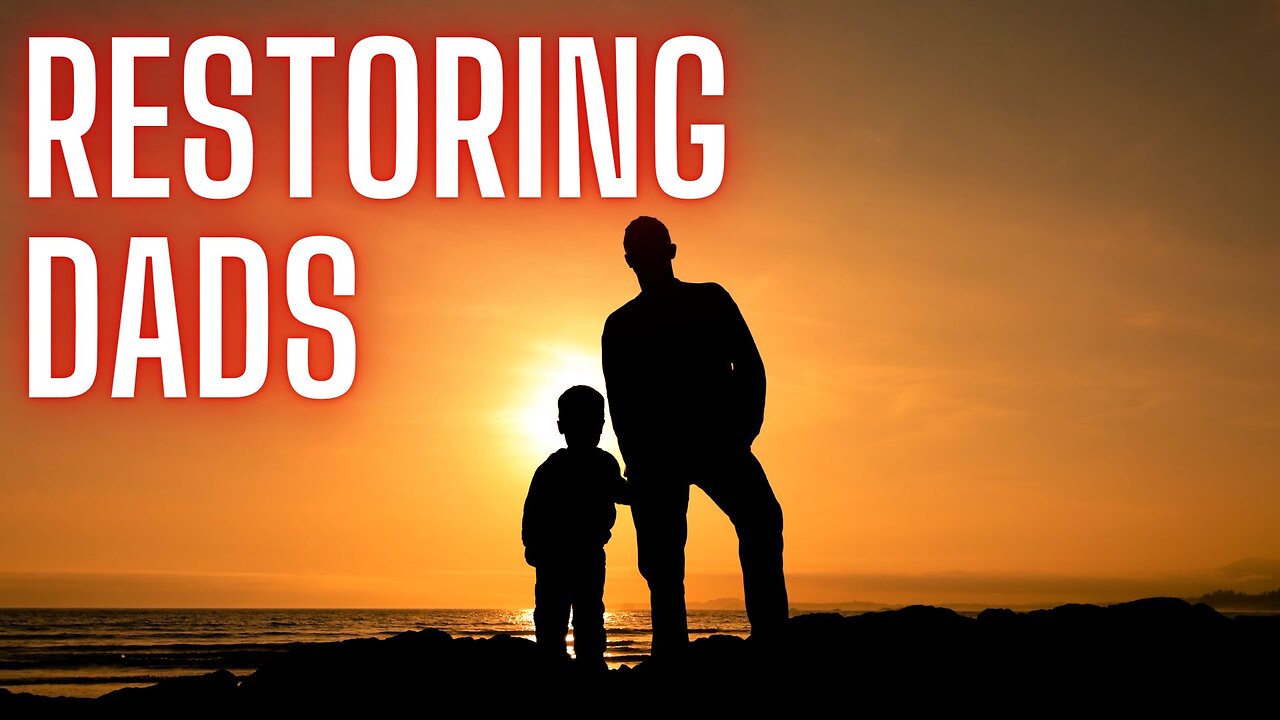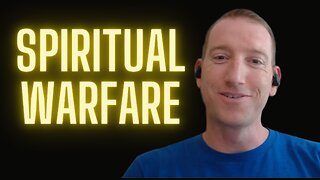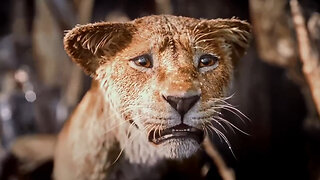Premium Only Content

58. Conversations with a Dad, Sean Radvansky
Nurse Kelly: [00:00:00] Welcome to after Hours with Dr. Sigoloff, where he can share ideas and thoughts with you. He gets to the heart of the issue so that you can find the truth. The views and opinions expressed are his and do not represent the US Army, d o d, nor the US government. Dr. Sigoloff was either off duty or unapproved leave and Dr.
Nurse Kelly: Sigoloff was not in uniform at the time. Of recording now to Dr. Seg.
Sam Sigoloff: Well, thank you for joining me. Again. I wanna thank all the Patreon supporters. I have a pandemic reprimand. Level tier where they donate $17 and 76 cents a month. And I want to thanks Sam and Angela Sheey and Perry. There's been a $10 custom level that's been made by Kevin and by Katie.
Sam Sigoloff: I wanna thank you two. And we also have a $5 level where people are donating what they can. $5 a month. It's the refine, not burned , and Joe and PJ are helping with that. I. Truly thank you all for all the help that you've been giving [00:01:00] and everybody who's been giving to our give and go. My wife and I truly appreciate that it's, we have spent over $60,000 in lawyer's fees, so we do appreciate every penny that that comes in and all the prayers that come in.
Sam Sigoloff: Today I have a special guest. His name is Sean Red Mansky. He works for Cisco. He's a sales a service sales specialist. And well, I wanted to bring him on to talk because he saw a particular need. , he, he saw a niche a group that wasn't being talked to, that didn't have any sort of, you know, coaching or, or help or just community.
Sam Sigoloff: And so he started a podcast and it was the dad conversation podcast. And the whole idea of this, I love this idea, is that he wanted dads that are in business or in some sort of work encouraging other dads with how they. And how they balance that life, you know, life work balance. And I was able to listen to a few of us podcasts and [00:02:00] they're, they're just really, really good.
Sam Sigoloff: And I wanted to have you on. So, so Sean, how are things going for you?
Sean Radvansky: Oh man, good to be here. And I just wanna say I love your podcast, Sam. I've had the pleasure of listening to probably at least 30 episodes and you've taught me a ton and done, just done great work. Like exposing facts and stories that you wouldn't get anywhere else. And you're a guest have been incredible.
Sean Radvansky: You know, tons of military service members, doctors, attorneys, veterans. I'm really honored to be here and invited on.
Sam Sigoloff: Thank you so much. Well, I, I really love what you're doing cuz this is what it's about. It's when you see a need and you do it right, like you, you see a problem and you're like, well, you know, I feel like men need more coaching because in society the dad has been the butt of the joke.
Sam Sigoloff: You know, the dad's a bumbling idiot. And I think that's one of the things you actually say in your intro is Dad has always been made this bumbling idiot and that. How [00:03:00] dads are supposed to be. Yeah, because we're , we're part of the family that keeps the whole thing. I mean, and, and moms too. They keep the whole family.
Sean Radvansky: Totally. Yeah. Better, better together. But yeah, that, that was the, the gist of why I started. It really is like, I love listening to podcasts. I've learned so much from all kinds of people on various topics at a deeper level. And you can't really get that type of quality discussions on any subject without going to podcasts.
Sean Radvansky: And so I was also, while, while being an avid podcast listener for years, Feel like I've got a tremendous network of amazing people, many of whom are dads. I know there's awesome people out there, but in movies and tv, like you said, it's just they're always the punchline, like some kind of neanderthal loser and or they're soft and whiny and.
Sean Radvansky: You know, effeminate or they're toxic or you know, just some kind of somehow broken. And so I was [00:04:00] like, there's rarely a courageous, hardworking, fatherly role model out there in the media. So As much as, I don't wanna admit it, I think that the TV and movies and pop culture like influences society quite a bit and changes the way we think and act.
Sean Radvansky: And so I was like, I want to just spotlight like normal, successful, good, interesting people who also happen to be dads and here like, tell me, tell me. Your career. First off, it's like, like if you were having dinner with somebody at work, you're like, so, you know, you're talking career stuff and like, so tell me a little about your life.
Sean Radvansky: Like, where'd you grow up, what'd you do? What are your, you know, what are your hobbies? And then, you know, at the end, kinda tell me a little bit about your approach to being a dad. Like, what, what are some things you think you're doing well? What, what's some lessons you learned from your dad if applicable?
Sean Radvansky: And how are you? You know what? Just trying to get a little bit of tips from, from various dads out there. So it's been really cool and one of the, one of the most fun projects I've ever done. [00:05:00]
Sam Sigoloff: Yeah. That, that's amazing. So let's, let's get into a bit. So let's pretend like I'm you and you're, you're on your own show.
Sam Sigoloff: So tell us a little bit about yourself.
Sean Radvansky: Ooh. So I am a father of six. I have an amazing wife, and we are living in the sort of excerpts of Raleigh, North Carolina. And I am a salesperson at Cisco Systems. Also love Brazilian Jujitsu. My, my kids are into wrestling and dance and yeah, just Grateful to be grateful to be alive in this country.
Sean Radvansky: And at this time.
Sam Sigoloff: And on a personal note, how did you get your kids at what age and how did you get them interested in Brazilian jutia or bj?
Sean Radvansky: They started doing it when? When I [00:06:00] started, and then. When we had a wrestling program open up like a, there's like a youth wrestling program that's sort of a club near the, that's at the high school gym on a couple nights a week. We wanted to get them involved. I, I wish I wrestled when I was a kid because all my friends who are wrestlers are just successful, like strong, hard working people, and they always talk about how helpful it was.
Sean Radvansky: So I thought, Man, I, I might have missed out, but I want to expose my kids to it. And they, you know, I practic was like, Hey, this is gonna be tough, you know, everybody says it is hard hard workouts and one-on-one battles. But anyway, they, they've really taken to it and, and like it, so all three of my boys are, are into wrestling.
Sam Sigoloff: And what ages did you start them or were they, when they started?
Sean Radvansky: They started jujitsu about four years ago, so they would be, they would've been like eight, [00:07:00] six, and four. And and then they started wrestling last year, so, yeah.
Sam Sigoloff: Yeah, I think what's amazing about that is you see so many people who do, they're such high function, high functions, and high producers.
Sam Sigoloff: And they, those types of men typically do some sort of physical sport, some sort of competitive sport like Brazilian Juujitsu. I mean, if you look at Juco Willin and a lot of the guests that he have on, he has on, they, they tend to do that, and it's what are some of the principles that you're learning from that?
Sam Sigoloff: Because it seems like that particular activity, you know, prepares your mind and your body. If I'm not. .
Sean Radvansky: Yeah. Well, I'll give you one example. Yesterday I went in for an MRI and they're like, are you, are you claustrophobic? Or, you know, does it worry you or stress you out? And I'm like, well, , I'm used to having 250 pound man on, on top of me [00:08:00] smashing me, trying to choke me.
Sean Radvansky: . So this will be great. I mean, this is, this is chill. But I would say lessons learned is just. The importance of slowing down and breathing everyone, you know anyone who tries jujitsu? Your first few months. The key is just like, Hey, slow down and breathe. You know, when you get into a bad spot or you're trying to go get an advantage, it's like, relax a little bit, keep breathing cuz you're gonna, you know, if you burn yourself out.
Sean Radvansky: In a, in a sprint at the beginning of a marathon, you're, you're not gonna do well on the back half. That's a, I think that applies to almost anything. When I'm oftentimes my worst busiest days, I'm, you know, you get into like a manic state of crazy trying to get everything done, and it's like, you know what?
Sean Radvansky: Just need to stop and breathe. Do some, you know, mental and emotional exercises here. Reset and prioritize and You can't, sometimes you can't get everything done, but just relaxing has been something I've learned from jujitsu. [00:09:00] Also learned, it's more fun to be the hammer than the nail, that's for sure.
Sean Radvansky: The, the more it, you know, the more tools that you pick up in your toolbox and abilities you have, you can, you can relax cuz you have more, like, more pieces of the puzzle to kind of put things together. But it gets really fun. I mean, it's, I don't know, it's Yeah, say those are the highlights for me of it.
Sam Sigoloff: And have you noticed a change in your boys, in their their bravery, their courage, their strength, their, their ability to face more difficult subjects than their peers? Not just physically, but maybe even scholastic?
Sean Radvansky: Yeah, I think the. Toughening up and being more resilient has been a, a big focus in our family over the last probably three years. And I think that jujitsu and wrestling have played key roles in that, you know, seeing that, hey, this is gonna be hard, you know, we're gonna go and try your [00:10:00] absolute best and you still might lose, but you know, you're, you're tough.
Sean Radvansky: You're not a quitter. Let's go. Come on, you got this. How bad do you want it? You know? And like, like we had a Saturday we, we had a jujitsu tournament and I remember my son, he's like doing really well. He's in a, in a bottom position on. Somebody's mounted over him and he's working on escapes and avoiding submission.
Sean Radvansky: He's trying to hit his own submissions and I was like, looking at the clock, I'm like, you have 45 seconds. You know, you're down by two points. Now's the time. How bad do you want it? You want to go? And it's like He started pushing and, and kept trying to kick it into another gear. He didn't actually succeed in his goal, but like I was proud of him just cuz I know how exhausting it is.
Sean Radvansky: When you're, you've been giving it your best and then the clock is running low, but you just keep trying for a little bit more. So super proud of him to, you know, stand up at the end. [00:11:00] Exhausted about to fall over because he had given it his best. And that's the kind of lessons that you can learn in a variety of applications.
Sean Radvansky: But certainly I think jujitsu and wrestling are, are good ways to foster that development.
Sam Sigoloff: It's a very physical description of a, of a mental idea, I guess is, is a way to put it.
Sam Sigoloff: Yeah. It, it shows you physically what you should be doing mentally. Is the discipline you have to have for it. Yeah. I love the idea of it.
Sean Radvansky: Yeah, it was, and one other thing that I thought was a cool story tied to Saturday that relates to parenting. So. The boys. I, I was really proud of all three of 'em. Like we, we grapple a lot with just the three of us. They've trained at a couple different places. But this was for all of us, our first competition.
Sean Radvansky: And so they're, they're geared [00:12:00] towards like, you know, survive, escape, put on, you know, their own submissions, but they've never. Even paid attention or known what the point system is about and like how that scoring points. So they're, they're more just kind of like freestyle grapplers, I guess you could say.
Sean Radvansky: So anyway they're getting behind on points. You know, they won some matches, lost others. And but none of 'em got submitted. I was proud of that. I was like, that's awesome. Good for you. But they, you know, when, when you do lose to somebody, whether it's your first match or you win a couple and then lose, they're, they're devastated.
Sean Radvansky: And unfortunately, we picked seats. We found a seat right next to the podium stage, which I wasn't thinking ahead, you know dumb moment. But we just see a constant stream all day of people walking by and the winner from each bracket gets a samurai sword. , which is pretty sweet. Wow. I mean, the kids, all the kids get samurai swords, so they're like, they're all, all week going into [00:13:00] it.
Sean Radvansky: They're like, I wanna win. I won that Samurai sword so bad. And so all these kids walking by with Samurai Swords, they're like, you know, I'm on the verge of tears almost. Just seeing like, oh, I wish I had one. And then my, my seven year old goes up, he's like, well, They sell the Samurai Swords, it's only $40.
Sean Radvansky: And he is like, and I've got $21. Can, or can you just gimme 19? I'll pay more than half. And I want the Samurai sword. It's gonna be cool. And then you know, like an hour later, his brother's his brother loses and, and he's just devastated cuz again he's really good and he almost won the match. And, and so my seven year old's thinking like, man, we gotta cheer him up, you know, we gotta cheer up James.
Sean Radvansky: And so he's. We, let's go get him a sword. We need to buy him a sword. And so I'm glad he wants to help out his brother, but we were like, I was like, all right, let's huddle up guys. All three of 'em, like, listen, swords are cool, but swords are for winners. You know, like if you, if we buy this sword, I hope that it.
Sean Radvansky: Is [00:14:00] makes you feel embarrassed that you bought it rather than earned it. And I was like, here's what I'll do. I thought about it for a second. I was like, I'll buy you the sword on the condition that you come back next year and do your absolute best. And if you win, you earn a sword and then you give away the one that we bought.
Sean Radvansky: But I hope all year long, this is like a reminder that I tried, I worked hard, but I wasn't, I didn't, I didn't win, didn't earn it. You know what I mean? It's like, I don't, I don't, I'm not a fan of participation trophies. Just showing up and not, not quitting through something that's relatively easy, but like, I wanna reward success.
Sean Radvansky: So anyway, we talked about it and they were like, you know what? Good idea. I don't want the samurai sword. I want to come back and earn my own next year. And I was like, hell yes. I was happy that they didn't feel like I was forcing 'em on it. They, they thought about it like, yeah, I want to earn it. I was like, good, good for you.
Sean Radvansky: They're they're way, I, I was, I feel like I was a wist when I was their age. And they are, [00:15:00] they're, they're becoming really strong, which I'm proud of and grateful for sports and all the lessons that come with it. . Yeah. I'm seeing just black for you. But, but at least
Sam Sigoloff: we can keep talking without having that corruption.
Sam Sigoloff: Okay. So you, you were saying, I don't know how, how long you were going on about buying the sword for his brother? For the older brother?
Sean Radvansky: Yeah. And yeah, not I just told him I was. Look, swords are for winners. You know, this is, we don't do participation trophies. We have, whenever they get a participation trophy from like a soccer team or, or whatever, it's like we go home and throw 'em away, , because he didn't earn anything.
Sean Radvansky: You know, just by showing up and participating in something easy doesn't get you something. So they did get medals. You know, two of the boys got medals for getting on the podium, but not first place. And I was like, samurai swords are for first place, dude. We're not buying it. So I. I'll buy it [00:16:00] for you if, if you come back next year, do your absolute best.
Sean Radvansky: And then if you, as long as you win next year, you give away the one that you bought. But I hope that every day when you see this samurai sword, you kind of hate it and you feel embarrassed to have it because you didn't earn it and it, it's a symbol of earning something, you know? So I think that's, anyway amazing.
Sam Sigoloff: Maybe I think it's a dad. Sorry.
Sean Radvansky: Go. Yeah, I kind of debate. I'm like, maybe I'm too much of a hard ass on these kids. But at the same time I'm like, I just think society in general is like trying to cater to everyone's feelings. And in the moment I felt like tremendous pressure. Like, ah, just get 'em a sword.
Sean Radvansky: Like man, they're all beat up and like sad right now. And they're, they're down in the dumps. But I was like, man, they should be like, they, they gave their all, they just tried so hard on this. Tournament like you, it's physically and emotionally exhausting. And like, [00:17:00] I was like tearing up just watching them compete, which doesn't happen often.
Sean Radvansky: I've never shed a tear while they were doing jiujitsu, you know, even if they get hurt or something. But like, just the, so proud of them going out there and giving it everything. So it's, it's an emotional day and like you don't, it doesn't go your way. Like of course you're gonna feel tremendous emotion, but don't, don't optimize.
Sean Radvansky: Helping their emotions in the moment. Like I'm trying to build a resilient child who grows up to be a strong man and a force for good, and I don't want to short change that future by catering to their needs in this moment. You know? I mean, that's really like parenting, right? You don't give the toddler everything they want because it's not good for them.
Sean Radvansky: I
Sam Sigoloff: think that that's a great thing that you're doing. It sounds like for the non dads out there, that sounds really harsh. I'm. Yeah, that's, that's for winners son. But, but truly that, that's so good because that's the difference between, I think you and I are similar age [00:18:00] to many kids and, and men just slightly younger than us, is they received participation in trophies and, and I think our age, they were starting to give out participation trophies, but I think when, at least when I was going playing different sports, which I didn't play a lot of sports growing up, but when I got those participation trophies, it's like, yeah, yeah, everybody get.
Sam Sigoloff: you know, I think nowadays it's like, Ooh, I got a participation trophy. Look how great this is. And I think that's good that we have dads saying, no winners get that you can be a winner. Two weeks. What
Sean Radvansky: did you do? You, you showed up on a Wednesday night for an hour for, for eight or 12 weeks and, and like had a Gatorade break every 10 minutes and barely broke a sweat some nights, like, and you get a trophy.
Sean Radvansky: Like, and I'm glad that my, my, my boys are as soon as we explained the absurdity of participation trophies, like they think it's awesome. They love like dunking their participation trophy in the trash can. When we get home, [00:19:00] they, they're like, yeah, this is stupid. You know, like they're, they're becoming molded to be more achievement outcome oriented.
Sam Sigoloff: Yeah, cuz there's, there's the old saying that second place is first place winners, which sounds harsh and it, and it, it is, but it also gives you something to look forward to, to be like, there's always gonna be someone better. And whoever wins is the one who puts the most work into it. And I think that's one of the most important things in life is teaching your kids.
Sam Sigoloff: It doesn't matter how smart you are, it doesn't matter how strong you are, it matters how hard you're willing to work.
Yeah.
For
Sam Sigoloff: sure. Cause I'm sure you had, I'm sure you had people you grew up with that were really smart, maybe smarter than you, but what are they doing in their life? Like there's plenty of kids I went to middle school, high school with that were much smarter than me. They were much more wealthy than I was, but they didn't work as hard as I did.
Sam Sigoloff: And that was the defining moment.
Sean Radvansky: Sure. And, [00:20:00] and on the flip side, like I can see people where part of me would think, man, that's not necessarily the brightest person I've ever come across, but they are running circles around me and everyone else because they just get after it. And that is like, so admirable.
Sam Sigoloff: And especially if, let's say a child has some sort of learning disability, which thank God my children were, were not I guess blessed with dyslexia like I was. , if that's a blessing, but I mean, it is, gives you different outlook on life. Some people go hard one way or the other, you know, they, they give up and they, they just kind of tank on the whole thing.
Sam Sigoloff: But what it did for me was it made me work even harder. And I, and I think that was a blessing that God gave me was the dyslexia, cuz it, it made me work 10 times harder than what it seemed like everyone else was doing because, you know, Going as fast as I can and still just barely keeping up with everybody, but that paid off as an adult.
Sean Radvansky: Totally. I, you could correct me on this, but I wanna say [00:21:00] sometime in the last year I learned that people with dyslexia are statistically far more likely to either be in prison or become a Fortune 500 ceo. Like it's like five times higher chances than anyone else , to go into either of those. So, like you said, strong inclination one way or the other.
Sean Radvansky: Yeah,
Sam Sigoloff: but I think that kind of reflects what I was saying. It's like you go hard one way the other way. Yeah. You go hard giving up and just giving up at life, or you go hard at working harder to try and get where you want to be.
Sean Radvansky: And I feel like that's the balance right there really of like parenting when.
Sean Radvansky: You, you want to help the kids become resilient and o and you develop resiliency by going through challenges and bouncing back. And you want to, you know, create diamonds through pressure, but you don't want to put so much pressure that they crack, you know, before they're a [00:22:00] fully fledged diamond. And so it's like that balance of.
Sean Radvansky: Trying to help them get through something hard without having them feel like there's no chance for success and they just want to fall apart and, oh, whoa is me. And so it's like sometimes we go too hard, sometimes not, not hard enough, but it's it's something I'm grateful to have. You know, my wife is my companion and, and sort of team up and share ideas and, and think through like, Hey, eh, that time maybe we over.
Sean Radvansky: That time we, we, you know, wasn't, we didn't really get the right outcome. We were looking for wasn't a positive experience in any way or, you know, that time we nailed it. But you know, it's just a balance of constantly trying. But like goal is I want 'em to be resilient. I want them to be able to get through hard things and develop a sense of pride and accomplishment because, The what am I proud of in my life?
Sean Radvansky: It's like the hard things I did, you know, it's not the things that were given to me. I'm proud of the, the hard things I got through. Right. [00:23:00] I'd
Sam Sigoloff: like to explore a little bit cuz you have, you said you had six children, which is just mind blowing to me. I think that's amazing and I don't know if I could handle that cuz.
Sam Sigoloff: My personal experience is when our daughter came out, like the moment sh they, the doctor handed me to her or handed her to me. I guess they're not gonna hand me to my daughter here. Hold, hold over your father? No. Like in my mind, cuz I wanted six kids, but the moment they handed her to me instantly I went, wow, I don't have time.
Sam Sigoloff: I don't know what happened in my time, but now I know it's divided twice as much as it was before. And I don't wanna get so much into the balance of life, but I wanna get into dividing or figuring out each child. Cuz some children, they need more pressure. Some children, you know, you, like you said, you'll crack 'em if you put too much pressure.
Sam Sigoloff: And having six that I'm sure every single one of 'em needs a different amount of, of pressure just to get that right spot. How, how, how have you balanced that? How have you figured that out?
Sean Radvansky: You know, that's, [00:24:00] Ongoing responsibility and, and opportunity for Susan and I to just constantly be trying to figure that out. You know? They're, they are, like you say, they're all, they're very, they're each individuals and have their own needs. Like there's definitely a, a family culture that we have that they all kind of have their own place in, but individual.
Sean Radvansky: Some are alike in some ways, but like for sure, they're all their own little person and their own. They have their own little sort of incentive reward systems in their mind and the way that they just go about life and ask questions and want to talk or share this or that. So I. I think Susan and I are one of, one of the things we, we've done well is that we're always trying, trying new things, trying to get better.
Sean Radvansky: Sometimes trying means we did just enough to keep everyone alive today,[00:25:00] depending on the day. You know, it's we certainly, I, I don't want to pretend like we are any role models out there by any means. We're, we're we're trying to figure it out and just, you know, take care of 'em and, and pour into 'em as much as we can.
Sean Radvansky: But I don't think I have any sage advice necessarily on that topic. Like,
Sam Sigoloff: well, I think just, you know, you, how you mentioned that you and your wife work together on this. Cuz there's times where I. Let me rephrase that. There's many times I don't see how I'm acting and I'm sure you, you've had this where you're like, you're too rough or you're too, not physically, but just you're too tough on 'em.
Sam Sigoloff: You're too easy on 'em and you can't see it from the outside cuz you're, you're doing it and that's where it's really good to have, you know, a spouse. Have your, have your wife come along and say, Hey, that was, that was a bit much. A hundred percent they have you wrapped around their, their little finger.
Sam Sigoloff: You need to, you need to toughen up on 'em just a little bit. Cuz you know, I've certainly had.
Sean Radvansky: . Yeah, yeah, yeah. That's, that's one thing. I agree [00:26:00] with you 100% because we don't, you know, we all, we have our own view, our own lens of looking at the world, and it's really helpful when one spouse can turn to the other and, and say, here's what I've.
Sean Radvansky: Observed and, and you know, from this angle, what do you think? And you're like, you know what? I was, I didn't, I didn't actually see that. And so that happens both directions with us regularly. And you know, one of the things recently is like our, we're a lot more lenient now on our, like toddlers. You know, the two younger girls are.
Sean Radvansky: Four and two we're, we're so much more lenient with them than we were with the older kids, because after a while we finally learn like, look, they're just, they're just so little, you know, like you can't expect them to be able to do certain things. But then sometimes we go a little too far where I'm like, look, this little two year old thinks she owns the house and we can't cater to her, to the point where we, we give her everything she wants.
Sean Radvansky: You know, we, let's start drawing a line. You know, alright. You're, you're not, you are literally ruining the entire [00:27:00] moment for everyone and you're gonna go sit in your crib for a little bit until you're ready to rejoin society. And you know, sure enough, like 45 seconds later she's like, I'm all better.
Sean Radvansky: I'm ready. And like, all sweet. And it's like, okay, cool. Well, you know, as a reminder to me that we kind of got away from the basics, like, you know, letting her go a little too far and you know, ruining every kind of family moment there is.
Sam Sigoloff: Yeah. One thing that, and, and you and I can talk about this at different time, you know, offline or something, but we noticed a huge difference when we changed our diet.
Sam Sigoloff: There was a lot less tantrums, there was a lot less meltdowns, there was significantly less, like there was a market change. And you know, when encourage moms and dads out there listening to this to go listen to my, any episode that has chewing the fat. It talks about diet and you know, it may be mostly directed towards fertility or mostly directed towards this or that, but the principles of it still are important.
Sam Sigoloff: [00:28:00] And the outcome is still, you know, you still get strong kids from strong food. That's how I sell it to my kids, is of each strong food. You get strong, you eat weak food, you get weak. Okay, well, I don't want to eat weak food. I wanna be strong, you know?
Sean Radvansky: Yeah, we're we're right now incorporating more. Meat into the kids' diets than we have previous.
Sean Radvansky: I think they've always got, had like enough from traditional standards, but incorporating more and, and Susan and I have been eating, I'd say primarily, Meat based for the last couple months and definitely feel, feel better and in, in several ways. So we're working on that and I would give credit to you, you know, one, one more of many nuggets picked up from your podcast.
Sam Sigoloff: Yeah. And if anybody's looking for more information on that, I encourage you to go look at Dr. Ken Barry, board certified family physician. He's on YouTube. [00:29:00] I learned a lot from him. And you know, of course he wasn't my only source, but. Learned from him and then did my own research and, and when you think about it, like what did people eat 10,000 years ago?
Sam Sigoloff: We should probably be eating that because that's what kept our ancestors alive to bring us here today. And nowadays there's diabetes, obesity, hypertension, all these problems. Let's go back to what we used to eat. So I'm glad you're seeing improvement. I'm glad you're, you're trying those changes, you know, it's not a huge jump all in for kids.
Sam Sigoloff: It's, it's a slowly slow change over time.
Yeah.
Sam Sigoloff: Growing up, what kind of sports or activities did you do and how did your dad's interactions with you influence you today?
Sean Radvansky: I grew up, did a little bit of, I don't know what, where this martial art was from, but it was called tongs. I think that was the only, [00:30:00] you know, school within five miles of our house that was like martial arts. So it was like karate, I think. I don't even know, maybe it was a branch of karate, but that was cool.
Sean Radvansky: You know, after doing jujitsu, it's funny, I look at that and it's silly because it's like these like forms and like. You know, technique. If 30 people try to attack you, then you take three steps left, punch, punch, punch, , you know, turn. It's like, it seems absurd now, but at the time I thought I was a little ninja, you know, wearing a GE and a belt and whatever.
Sean Radvansky: Did that for, I don't know, a year or two and then played a lot of baseball. I was actually like, Pretty good at baseball for a few years and I wound up getting hit by a pitch, like three pitches in a row and pretty much never recovered from that with my confidence at the plate. So my baseball career came to an end in in early or late elementary school.
Sean Radvansky: What, what did you say?
Sam Sigoloff: Where did you get hit? Head, chest,
Sean Radvansky: arm. I think [00:31:00] I took one to the helmet. And then I don't recall the other two. I'm, I would, I'm guessing leg or side, or, I don't know. But yeah, I, I don't even know how I could possibly get hit three times in a row. That's pretty embarrassing. I bet if
Sam Sigoloff: we, I bet if we talked to that guy who threw those pitches, he'd probably say, man, I, I never played again after that.
Sean Radvansky: I don't know. . Yeah, that'd be funny. But my dad he coached my little league baseball team one year. But my, my dad actually had to He did not ever have like consistent, stable or high paying employment. He was typically working multiple jobs and The only way to even like, I wouldn't even say get ahead, but just like pay off some of the overdue bills was like take on extra, you know, jobs and just trading hours for a little bit of [00:32:00] dollars.
Sean Radvansky: So he was honestly gone like a lot. And I had the opportunity to work with him a few times, like doing little construction jobs like on the weekends. I remember when I was like 12, he's like, Hey, come with me on the job site. You know, we're doing vinyl siding somewhere or, or whatever. And it is like, You know, back then he would be like $20 a day.
Sean Radvansky: Just kind of, you know, I'll give you random little things to do and clean up the job site and go hand, hand me stuff, you know, be a gopher. And I remember it being like miserable, you know, in, in the summer heat working on the job site, not eating or drinking. You know, my favorite foods not in the air conditioning.
Sean Radvansky: I was like, This sucks. Like I am getting straight A's because I don't want any part of manual labor. You know, like I, I been there and done that and I was like, I know my dad has worked his tail off and routinely does even, you know, in his thirties and forties and and fifties, like, I want. No part of that, I want to be, [00:33:00] you know, I was always a pretty decent test taker and knew like, Hey, I've got a career, and like, go to college and do something.
Sean Radvansky: You know, use your, use your mind and, and get ahead. And so I feel, I feel like my dad set an example of like always. Like I, I feel like his thirties and forties probably sucked. Like realistically, I'm in my, you know, mid thirties now, and it's like I'm trying to enjoy and optimize my life and take care of my family and do hobbies like my dad's life.
Sean Radvansky: He literally would get done with one job, change clothes and go to another job. And like I didn't see him much. He was always gone. And so like, that's admirable. And, and I wish he had like taken advice from others or networked or tried to get a better job. Cause I think he certainly could have, he had the abilities, but that just wasn't his like style or interest.
Sean Radvansky: But he, you know, he made sure we had food and we. You know, he took care of the fam his family by working his tail off at, which I think is a lesson to me. Like I, I knew [00:34:00] from an early age it was like, Hey, we're poor. We're, you know, we're on welfare and other assistance and stuff. I don't wanna live like this.
Sean Radvansky: You know? So I feel like he, he, he taught us through an example of how to work and I knew early on like, your, your work matters.
Sam Sigoloff: And that's one thing that's really tough about being a dad is to be around and to be in a direct influence means you're not at work being an indirect influence. Cuz my, my dad, he worked hard to, and he, you know, there was many weekends he was off doing side side jobs and stuff and, you know, I want one more time with him, but he also taught me great work ethic.
Sam Sigoloff: So it's that balance of, you know what I mean?
Sean Radvansky: Yeah, yeah, yeah. It's hard to put in words. I know what you mean. Like, like the, the time that you do get with them, you're sometimes is, is working. Like if you, the best way to spend time with dad, for me, when I was a kid was like, go work with him. You know, cuz he was just working.
Sean Radvansky: Or same thing with my uncles, you know, like they're just, [00:35:00] they're just animals, man. I feel like I'm, I'm so weak compared to them in that generation. Like they live to work. And, and you know, Saturday's a work day, just sometimes it's for. Same, same projects you're doing during the week, other times it's it's a different project, but you're, they're working nonstop.
Sean Radvansky: But
to kind of
Sam Sigoloff: balance that too, I think our generation has been like, look, I wanna build my life in a way that I can have my time to do what I want, what I want. You know, for some dads, that's time with their kids. For some dads that's doing whatever they want to do. But I've, I've certainly built my life to where my family is one of the most important.
Sam Sigoloff: and you know, like doing stuff after work. If it's not with my family, I don't really wanna be there doing it, you know?
Sean Radvansky: Yeah. That and what a blessing that we live in such a prosperous society that many, many millions of, of. Families can work reasonable work hours and [00:36:00] have time to pursue interests and hobbies with your family.
Sean Radvansky: You know, that's, that's something that people haven't always had. And so, yeah, it's like that balance of, I, I saw my dad and my uncles working like dogs. And you know, I don't, I'm fortunate that I, I work for a fantastic company. I work a normal work week and I'm done. I'm not even. Usually I'm not stressed about work in the evenings on any kind of regular basis.
Sean Radvansky: I'm, I'm unplugged and straight up with the family or, you know, doing jujitsu or whatever. But it's like a balance where my kids see me have it so easy. You know, like I go in my little office, I'm, I'm on phone calls and emailing and you know, talking to customers. They, you know, they don't see me working like I saw my, my dad and my uncles working.
Sean Radvansky: So it's like I have to consciously think, how can I teach my kids hard work when we've got [00:37:00] it so, so cushy on, you know, standing on the shoulders of previous generations that have created this prosperity and, and wealth and, and all the benefits and privileges we have living, living on the earth.
Sean Radvansky: Right.
Sam Sigoloff: Now I heard you mention you know, say, say certain key words that kind of clued me into this. And, and you and I have not talked about this before, so I dunno where this is gonna go. It's interesting. Is there any sort of religion or spiritual aspect to your life that's important to you, that you're trying to make important
Sean Radvansky: to your kids?
Sean Radvansky: Yeah, totally. We are acting practicing active members of Church of Jesus Christ, of Latter Day Saints. So we are Christian and yeah, that's like a big part of, of our lives. And we encourage the kids to come to church with us and actively participate in, you know, Spiritual conversations. My wife's really good actually on like, just even on the drive to school, you know, she tries to like [00:38:00] find a, a story from the Bible or the Book of Mormon and like teach a principal on the way to, you know, dropping the kids off.
Sean Radvansky: Or each night we try to have a. Yeah, conversation and just talk about principles or scriptures and lessons learned and you know, a lot of good videos on YouTube or old talks and, you know, articles to read. So definitely you know, faith in Christ is a big part of our life.
Sam Sigoloff: I think that's great.
Sam Sigoloff: And just something that we had done we haven't done so much lately, but on YouTube, there's. N this channel called Bible Project and we would watch those in the evenings with the kids and they have a way of showing things. And, and there's this one video in particular where they have these two different trees, the tree of good and evil, and the tree of the knowledge of good and evil.
Sam Sigoloff: And there's a good tree and it's, you know, you can clearly see it's a good tree by the light. And when people eat it, they, they become a tree that's [00:39:00] another light giving tree. And then there's this bad tree that has dark light in it. And if they eat from that, they become a dark tree. And it's, it's a really good way that we've been able to, to help teach our kids to understand these ideas.
Sam Sigoloff: It, they're hard to explain. And, and like, let's say one, one of my chi, one of my children is doing something that's not so good and I, I can ask them, which tree are you picking from right now? It's that idea of Adam and Eve. You know, they, yeah, they chose from the wrong tree, but we do that every day that that's a constant decision you and I make every single day is what tree am I gonna pick from?
Sam Sigoloff: The one that makes things better, the one that makes things. And that kind of puts it in real terms where they, they don't know what that means. And I don't know what that means, what tree am I picking from? But it's a way they can physically see something and see how well I wanna pick from this other tree that makes me a tree of light rather than makes me a tree of darkness.
Sean Radvansky: That's a good, a good example. And we're, we're so fortunate that there are. [00:40:00] Content creators who know how to break things down for children. And that's, you know, there's certain channels where that's all they do is cater towards, towards kids and Bible stories and it's like, this is amazing. You know, don't the cost of watching a couple commercials for a few seconds, you get a cool five or 10 minute video that.
Sean Radvansky: Perfect for the kids. Like they actually like enjoy it. They look forward to when the new videos come out a couple times a week. It's like, this is, this is cool. . There's a lot of things with society right now where you think, like, it feels like everything's falling apart, but then at the, at the other time, it's like other side of the coin.
Sean Radvansky: You have to think like we have it so good. And any, any wishlist from someone who lived in the late 18 hundreds who like, you know, what would you want in your life? Like even person on welfare in the United States. You know, living in poverty had, would have essentially everything on the wishlist of someone from a [00:41:00] hundred or 150 years ago.
Sean Radvansky: You know,
Sam Sigoloff: we are so truly blessed right now. And even, you know, the poorest among the Americans are still in the top. I think it's 1% of the world. , .
Sean Radvansky: That's nuts.
Sam Sigoloff: It's, it's just amazing. And how we have to push those blessings out. You know, we don't just keep them and and hoard those blessings, but that's one thing we're working on teaching our kids too, is how can you bless others because we've been blessed so much.
Sam Sigoloff: How can we be God's hands and feet to go do his work? Totally.
Sean Radvansky: Yeah, that's we need to do that. I mean, can't just, it's gonna be a little bit embarrassing if we talk to God after, after we die. And he's like, so, gave you all those tremendous resources and you lived a very comfortable life with silk slippers and You know, tell me about how you multiplied the blessings on other people, you know, and if we don't have much to share, that's gonna be an embarrassing [00:42:00] conversation.
Sean Radvansky: So always trying to figure out how can, how can we help?
Sam Sigoloff: Well, I think we're getting close to probably time right now. I mean, I really want to thank you for coming on. Is, is there a last few story or a thing you wanna leave us with about that you, that you've learned from doing this, this podcast with dads to help dads, you know, kinda like those content creators you were talking about earlier with children, but now you're doing it for, for dads.
Sam Sigoloff: And I think, again, I think that is a wonderful little niche.
Sean Radvansky: Yeah. I think that I learned. Keep trying. You know, there's so many different ways to be dads to be a dad. And I've talked, you know, it's been awesome to go talk to people, dads from all different types of backgrounds and. , I, you know, I haven't heard anyone [00:43:00] share that They're like really disgruntled about the way their dad raised them
Sean Radvansky: So it's like a little reassuring for me to hear. Like, I think people generally, they look back on their dad and give them the benefit of the doubt. And you know, I came away with the impression we should. Try our best. Don't beat ourselves up about being imperfect, you know, show love and, and support and, you know, make sure you have a positive relationship with your kids and, and do your best.
Sean Radvansky: That's really my, my takeaway. And I, I do wanna say I before I go first of all, thank you for having me on, and I'm honored to be in the presence of amazing people who you've had on your podcast. But I know a lot of, I would guess a lot of your listeners are probably in the military. And so I just wanted to say like, get the word out.
Sean Radvansky: I think. I read encourage anyone who's looking to transition back into civilian life to consider going into tech working at a a tech [00:44:00] company. Great. Career opportunities. Again, you can go into operations, finance, marketing, sales, you know, hr, supply chain, like whatever you, whatever you want to go into.
Sean Radvansky: The background you have in the military is helpful. It's applicable. There's skill bridge programs, there's recruiters, like almost every major tech company has. Giant teams that focus on recruiting directly from the military. So I think it's one of those things. It's so good, it's such a good opportunity, but a lot of people don't even know that it exists.
Sean Radvansky: And so consider that there's the, the earnings and work life. Balance is un unparalleled from anything else I've seen. You know the opportunity to make tremendous income, take care of your family, have time for your family, you know, working a, a 40 hour work week and enjoying enjoying life.
Sean Radvansky: So anyway, just wanted to put that out there. I'm, you know, if anyone's interested in Cisco, I can connect you with different [00:45:00] folks recruiters there. But there's certainly, you know, I'd just say look into tech is a great opportunity.
Sam Sigoloff: Yeah. And if you have any contact information, I can put it in the description below, like an email or something.
Sam Sigoloff: If you have an email you wanna put out. Yeah. And thank you. Love to thank you for that. Cuz many of these listeners may be getting outta the military sooner than they anticipated and, and looking for a job that, yeah.
Sean Radvansky: That
Sam Sigoloff: the life balance they want is that, that's, thank you for that hope.
Sean Radvansky: Yeah, there are exemptions you can get in the private sector that you can't get sometimes is what seems like in, in the military right now.
Sean Radvansky: So yeah.
Sam Sigoloff: Well, thank you Sean. I truly appreciate your time. It's been a wonderful conversation. I hope to talk to you more in the future.
Sean Radvansky: Thanks so much, Sam. Great to talk to you.
Sam Sigoloff: I wanna give a special shout [00:46:00] out to Shell Pace. Thank you for your monthly support. Just a reminder for everyone out there in duty, uniform of the day, the full armor of God. Let's all make courage more contagious than fear.
-
 1:01:07
1:01:07
Dr. Sigoloff
1 month ago140. Awakening and Understanding the Bible in Relation to 9/11
435 -
 1:45:59
1:45:59
Spittin' Chiclets
1 day agoCanadian Chokejob - Game Notes Live From Chicago - 12.28.2024
193K29 -
 9:18
9:18
Space Ice
16 hours agoThe Guyver - Alien Bug Suits, Exploding Dragons, & Mark Hamill - Weirdest Movie Ever
92.1K19 -
 12:46
12:46
RealReaper
2 days ago $6.99 earnedMufasa is a Soulless Cash Grab
70.2K7 -
 5:14:24
5:14:24
FusedAegisTV
17 hours agoWelcome to The King of Iron Fist Tournament! \\ TEKKEN 8 Stream #1
123K1 -
 DVR
DVR
Bannons War Room
1 year agoWarRoom Live
101M -
 5:42:36
5:42:36
FreshandFit
23 hours agoLive X Censorship For Opposing Immigration?!
233K109 -
 1:08:16
1:08:16
Tactical Advisor
18 hours agoNEW Budget Glocks | Vault Room Live Stream 011
120K9 -
 16:30
16:30
SNEAKO
1 day agoNO FRIENDS IN THE INDUSTRY.
156K68 -
 6:19
6:19
BlackDiamondGunsandGear
1 day agoHow Fat Guys can Appendix Carry
109K12